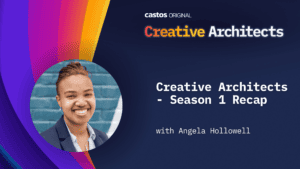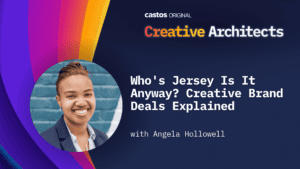As with many new hobbies, a fair bit of research and reading is required to figure out the best way to start. Podcasting isn’t much different so there has always been need for diverse resources teaching Podcasting 101.
According to Google Trends, the phrase “how to start a podcast” has averaged 60 searches per day since 2016. With low barriers to entry and the ability for just about anyone to start podcasting, the Bello Collective was ready to answer that question.

Launching in 2016, their efforts came just in time. With a diverse team of writers to build a solution, the Bello Collective started publishing podcasting resources to help hosts get started, grow, and sharpen their craft.
Fast forward to 2020, that community has grown to elevate voices that don’t always get enough airtime. With readers and writers across Slack, email, Twitter, and their website, Ashely Lusk and Galen Beebe are the co-editors steering the ship.
On this week’s episode of Audience, Craig sits down with Lusk and Beebe to talk about the Collective and how they built such an engaged community. Listen to the full episode now to hear firsthand why interrogating your definition of success can make you a better podcaster.
Why Communication Is Key
In the past, blogging and podcasting were primarily one-way conversations. The writer publishes an article, the reader digests their thoughts without the opportunity to directly collaborate with them. The podcaster releases an episode, the listener tunes in without being able to connect with the person on the other side of their headphones.
But as industries shifted, so did the technology that enabled creators and consumers to start a dialogue. Podcasters are urged to start newsletters, social media accounts, YouTube channels, and Patreon followings to fuel the connection.
Bello Collective was built from this foundation of dialogue. When pressed about how they morphed a static publication into a living community, Ashley and Galen highlighted the importance of having conversations with intention.
Open dialogue is at the forefront of all of their interactions. For new writers, this means clear expectations about the editing process and what content they are looking for. Within their Slack channel, members can’t join until they agree to community guidelines that say keep all responses off the record. By doing so, every member can speak freely and surface discussions that may have otherwise been missed.
For podcasters, an open dialogue takes a few forms. It’s having conversations with co-hosts about how to improve a show or with guests about an interview’s expectations. Even though this isn’t the first time you’ve heard communication is key, there’s a reason it works. It’s a good time take a moment and reflect on your podcast. Have you fallen victim to going through the motions or do your episodes and conversations have intention behind them?
Another benefit of having more conversations between a podcaster and listener is the opportunity to transform passive followers into active participants. This is where an engaged community starts to form.
Transforming Passive Followers To Active Participants
Establishing a team of diverse voices is the basis of Bello Collective’s success. Each writer has different tastes to recommend unique podcasts and has the ability to see story angles that others can’t. The wide bredth of content and opinions allows the Collective to talk to a wider audience and provide resources written by someone with the same background.
To stoke their writer’s engagement, the Collective has a Slack channel, Twitter account, and a bi-weekly newsletter. The co-editors will pitch questions or ask for recommendations where every writer has a chance to weigh in. In doing so, they remove some of their blindspots and can pass along unique suggestions to their readers.
In describing their relationships with their readers and writers, Galen also mentioned making sure she and Ashley viewed themselves as active participants. For the podcasts they love, it’s their job to think about ways to support them. Whether that’s a financial donation, a positive review, or word of mouth recommendation.
They encourage their entire community to move from passive followers to active participants too. It was this encouragement to lift up creators whose voices are heard less that brought tell-all interviews with Kaitlin Prest and The Mysterious Breakmaster Cylinder to life.
After listening to the episode, we encourage podcasters to think about how to adopt this mindset. Will featuring new guests or highlighting a typically stifled perspective energize your listeners to actively support your show? How can you galvanize your community to organically grow a listenership?
Does Monetization Equal Success?
The battle between creative fulfillment and earning an income has been part of the media industry from the beginning. Podcasting is both a side hustle and creative outlet, each with their own definition of success.
During our interview, Ashley reminds us that there’s always been the conflict between creating something that you want to make versus something that will succeed in a marketplace. And we agreed with her when she said it’s likely a problem that will never be solved.
So does monetization equal success? With a lot of podcasters asking how to pitch sponsors and set up a Patreon, it might feel that way. But rather than compare your show to others, interrogate your priorities and uniquely define what success means to you.
Is it seeing 100 downloads per episode? Being retweeted by one of your heroes? Or can feeling joy every time you sit behind the mic be called a success?
Resources Mentioned In This Episode
- Read more at the Bello Collective
- Subscribe to the Bello Collective newsletter
- Follow @BelloCollective on Twitter
- Support their work and join the Bello Collective community



